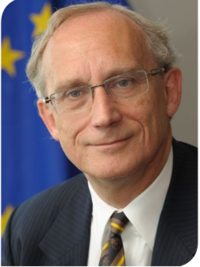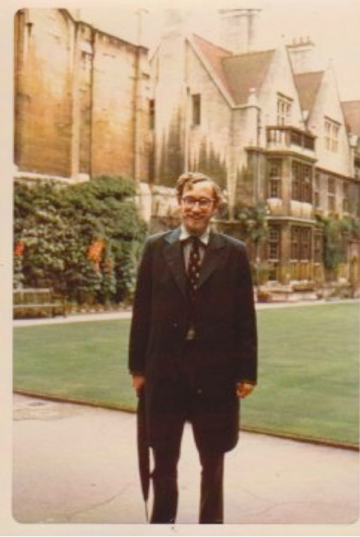History Careers - Oxford History and the Civil Service
As a European civil servant, historical knowledge was an important tool in building relationships and establishing trust.
Nick Ilett was educated at Rossall School, an independent school in Fleetwood, Lancashire, largely funded by a scholarship. After A Levels he was awarded an Open Scholarship to read Modern History at Brasenose, matriculating in 1969. Between his second and third year in Oxford, he was an exchange student at Munich University in Germany. In his final year he came second in the Arnold History Essay prize. He graduated with First Class Honours in 1973.

Career Summary
After graduation Nick promptly joined the Civil Service as a fast stream Administration Trainee in HM Treasury. He did a dozen interesting and varied Treasury jobs at different levels. He was twice posted, for a total of six years, to the UK Permanent Representation to the European Communities/Union in Brussels, on secondment to the Foreign and Commonwealth Office.
He took paid study leave for 12 months in 1980/81, obtaining the Diploma in Economics at Cambridge University.
In 2002 Nick moved from the British Civil Service to the European Civil Service as a Director in the newly created European Anti- Fraud Office, part of the European Commission. He held four senior management posts, and was twice acting Director General, retiring in 2018.
Advice to my younger self
Money is of course important but it isn’t everything. If you do well in a prestigious underpaid public service job such as the Civil Service, you can usually opt to go for the money later, should you so desire or should circumstances make that essential, on the basis of your experience, the intellectual clout you will have developed, and your proven track record!
What really is important is to do something that interests you, challenges you and that you yourself can respect. I remember working in the Treasury on the rescue operation for a privatisation share sale that had gone wrong, when I was in my mid-30’s. We put the package together with the Bank of England and advisers from major City firms. The Chancellor of the Exchequer held an evening meeting around his enormous conference table, to finalise the deal and brief himself on the details before going over to the House of Commons to make his emergency statement at 10pm. I was sitting next to a man of my own age from one of the big accountancy firms. He reckoned that this was the most interesting thing that he would do in his entire professional life. It was interesting for me too, but it barely scrapes into my top ten.
Here Nick reflects on the relevance of his History studies to 45 years as a British and European civil servant
I attended my first lecture as an Oxford historian in October 1969, aged 17 ½, clad in an nth-hand scholar’s gown for which I had paid ten shillings and wielding a new notebook, both of which I still possess. It seemed a natural progression. My parents were both history teachers with Oxford degrees. My father Norman’s time at BNC had been interrupted by 5 years war service – the Australian veteran he sat next to in Finals muttered that he ‘couldn’t remember the names of the bleeding monarchs’. My mother Glenys Parry had firewatched twice a week on the roof of the New Bodley. In June 1944 she waited an hour to cross the High as American armoured columns moved south. (Five or six years ago she received a letter from St Hugh’s commencing with the words ‘Now that you have graduated ...’.)
I specialised, so far as the syllabus allowed, in the period between 1815 and 1939. At the end of my second year, I had the good fortune to be nominated as BNC’s exchange student at the Stiftung Maximilianeum in Munich. I fear I was a less interesting guest than the Bavarian post-graduate who came in the opposite direction, a psychologist who wore knee-length boots and claimed to be researching ‘the sexual perversions.’
So, I spent 1971-72 at Munich University, the LMU, exploring the Bavarian State archives for material relating to British involvement in Greece during the 1840s and participating in a massive seminar covering the whole of Irish history. My contribution to the latter was a paper, written in English, on Northern Ireland since 1880. This was discussed some weeks after Bloody Sunday, in the febrile atmosphere of German student politics at that time. I have had few subsequent illusions about the UK’s image among our neighbours.
Back in Oxford I lent my Irish paper to a politically ambitious PPE undergraduate, friend of a friend, who was preparing for a Union debate. We next met in the Treasury two decades later, by which time I was a middle-ranking official and he was a middle-ranking Minister. The subject was the poll tax. I did not remind him of our previous acquaintance, but fortuitously or not he did bail me out when I was asked a question which I could not answer.

In my last year, my dissertation on an aspect of British relations with the Bavarian monarchy in Greece came second for the Arnold Prize. The marks in my Finals papers proved inverse to my knowledge of their subject matter and the examiners thought it unnecessary to read my dissertation – undergraduate theses were optional and rarely submitted at that time. I took the advice of a potential DPhil supervisor, to take a good job if one was offered.
The ‘good job’ followed the Civil Service Examination, the other ordeal of that year. I was a civil servant for 45 years; 29 years as a British official, 16 as a European official; 22 years in Whitehall, 22 years in Brussels, and one year on study leave reading Economics in Cambridge. (My Tripos marks were proportionate to my knowledge of the subjects, there was nothing to read in foreign languages, and the undergraduates of 1980 were tame compared to my generation.)
I started in September 1973 in the Treasury team which worked on inflation control under the Heath Government. The failure of the policy led to the collapse of the Government within months. Nine jobs later, I was the Treasury Head of Division for local government finance, covering the last weeks of domestic rates, the short life of the poll tax, and the first years of the Council Tax. So, I worked on all three of the local taxes on households imposed in England over a period of centuries.
I was posted to the UK Permanent Representation to the European Communities in Brussels four months after the 1975 referendum. I was the youngest and most ignorant member of this Mission during the first UK Presidency of the Council in 1977, and boasted excessively of this accomplishment during the first Presidencies of most subsequent new Member States.
I was team leader for the EU Budget in the Treasury when John Major faced down the ‘bastards’ over EU finance in 1994, the only occasion I got inside the Cabinet Room in 10 Downing Street - briefly and silently. I was the head of the economic section of the UK Permanent Representation to the European Union when the euro took form at the turn of the millennium; my FCO seniors thought we would be joining; my Treasury seniors thought otherwise.
At the time I retired in August 2018, as acting Director General of the European Anti-Fraud Office (known not always affectionately as ‘OLAF’ from its French acronym), I was one of the three UK nationals still at the head of departments of the European Commission as the Brexit negotiations wound on.
How much a part did the Oxford history course play in all this?
I suppose the first point is heightened appreciation of a sense of history in the making. I have been privileged to witness from the inside or close to the inside many events which have marked the last half century - not just the crises of the Conservative Party mentioned above, from the 3-day week to the poll tax to Brexit! I would at least like to think that I witnessed with a historian’s perspective.
Second, there is the familiar argument that the historian’s intellectual training is good preparation for the higher civil service. My Oxford training helped me to digest large quantities of information and to synthesise rapidly, coherently, and accurately (at least without identifiable error), attempting to apply what Whitehall appreciates as ‘sound judgement’. In my time the Oxford course was much more about acquiring knowledge from others than about research. This seems to have changed since. The writing (‘drafting’) skills also helped, as did the capacity to read foreign languages.
Third, a knowledge of history was genuinely useful, particularly in jobs dealing with the EU, both as a national and a European official. As a national official it helped to understand where we have come from and where others are coming from. (I sympathise with the current generation of UK civil servants which is trying to cope with a political class which knows little of British history and nothing about anybody else’s history.) As a European civil servant, historical knowledge was an important tool in building relationships and establishing trust. This was also so in the management of multi-cultural staff. I have calmed angry Greeks with reflections on Ali Pasha of Ioannina (not to be confused with the EU’s Ioannina compromise), reassured Hungarians by showing understanding of the Trianon Treaty, and navigated awkward Irish and Austrian waters after other senior EU officials had confused native language with native country.
The downside to reading history was lack of the professional knowledge which is (hopefully) acquired from courses more directly related to the future job.
I was a non-economist in the Treasury and a non-lawyer in OLAF. In practice this was as much perception as reality, since one learns the specifics necessary for each job, and specialists are appointed when specialists are needed. There was some criticism in the Brussels village that someone without a law degree, still less a professional qualification as a public prosecutor, could become Director General of OLAF, even on an acting basis. My jocular retort that I was a graduate of an Oxford College with an outstanding reputation for law, but in another subject, was not wholly convincing. That said, there is no more dangerous official than he (less likely she) who studied law 25 years ago and does not bother to get legal advice from a proper lawyer. I did not fall into the legal traps which ensnared some others with more conventional CVs.
There is, of course, no academic training which in itself is sufficient preparation for the Civil Service, and in my view – to take the economist’s axiom in reverse – none which is necessary.
I have worked with British and European civil servants of different academic backgrounds. Some of the best have been mathematicians; some of the others, classicists and lawyers. Diversity is important, here as elsewhere. Public services which restrict entry to graduates in particular subjects are less effective. This is true of the German and central European practice of treating the civil service as a branch of the legal profession, and in some respects, it applies to the French grande école system.
The European public service has benefited from a less restrictive approach. It evolved for four decades towards British models and under the influence of Brits in key roles at different levels of the political and official hierarchy. Now that the UK has left the EU (at least for a decade or two) this is a legacy of which we can be proud. In my last days in the European Commission in the summer of 2018, I congratulated a young EU official of Austrian nationality on an excellent piece of analysis. I was surprised, given Austrian tradition, to be told that he had studied history. He was even more surprised when I replied ‘Ich auch – me too …’
Nick Ilett
Brussels, May 2021




